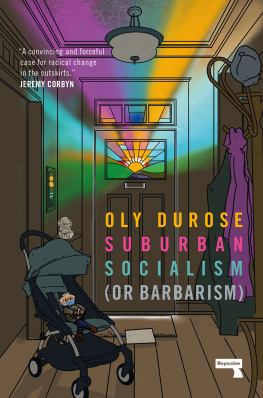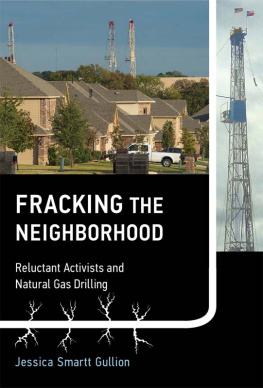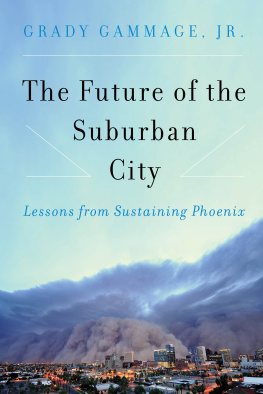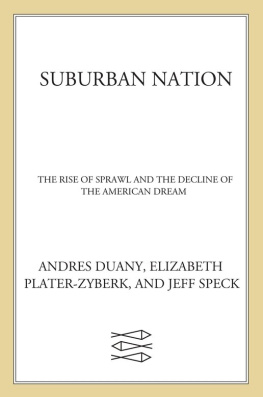Contents
Guide
Pagebreaks of the print version
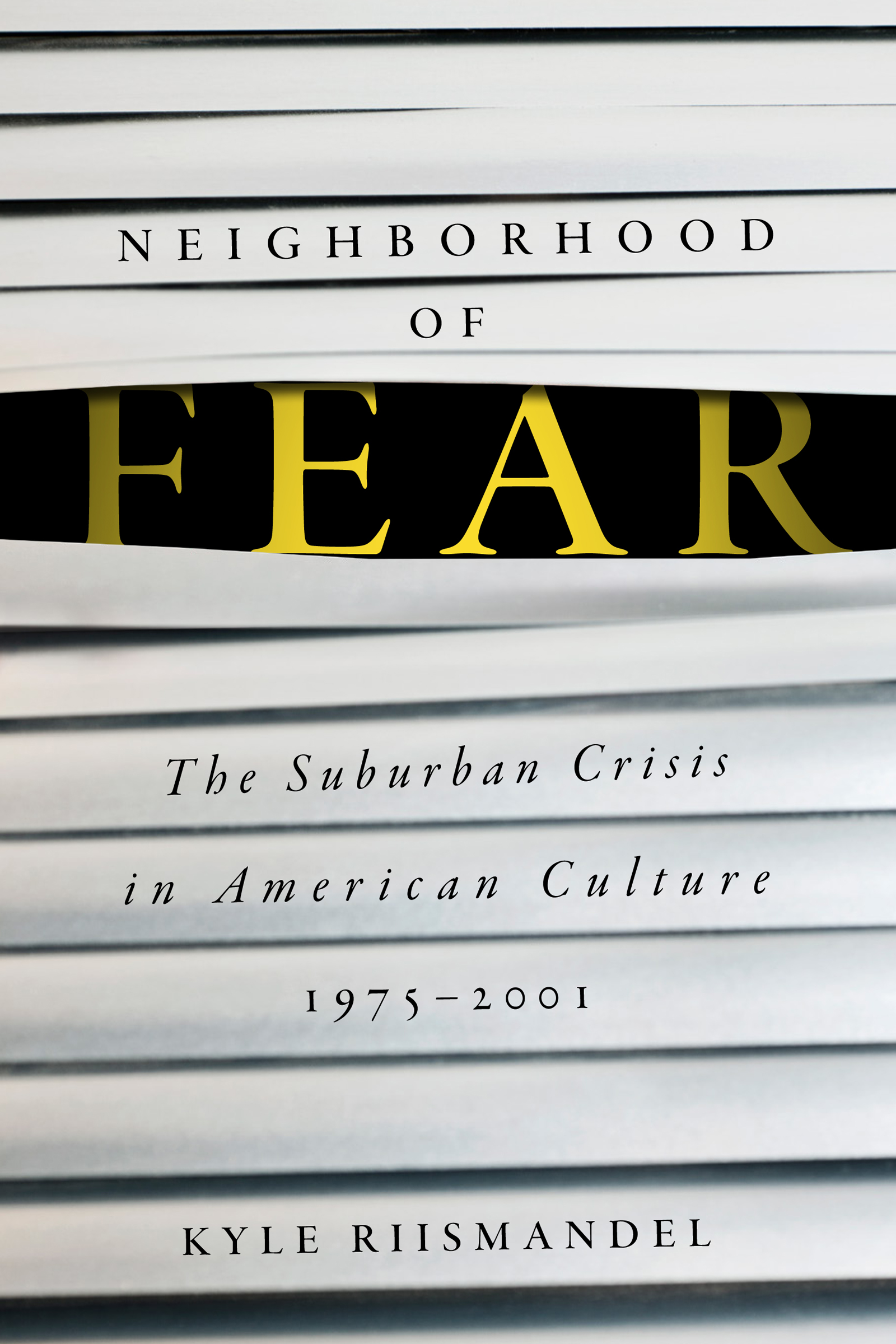
Neighborhood of Fear
Neighborhood of Fear
The Suburban Crisis in American Culture, 19752001
Kyle Riismandel

Johns Hopkins University Press
Baltimore
2020 Johns Hopkins University Press
All rights reserved. Published 2020
Printed in the United States of America on acid-free paper
987654321
Johns Hopkins University Press
2715 North Charles Street
Baltimore, Maryland 21218-4363
www.press.jhu.edu
Library of Congress Cataloging-in-Publication Data
Names: Riismandel, Kyle, 1978author.
Title: Neighborhood of fear : the suburban crisis in American culture, 19752001 / Kyle Riismandel.
Description: Baltimore : Johns Hopkins University Press, 2020. | Includes bibliographical references and index.
Identifiers: LCCN 2020006277 | ISBN 9781421439549 (hardcover ; alk. paper) | ISBN 9781421439556 (ebook)
Subjects: LCSH: SuburbsUnited StatesHistory20th century. | Suburban lifeUnited StatesHistory20th century. | SuburbanitesPolitical activityUnited States. | SuburbsEnvironmental aspectsUnited States. | FearPolitical aspectsUnited States. | Privilege (Social psychology)United States. | Social valuesPolitical aspectsUnited States. | United StatesCivilization20th century.
Classification: LCC HT352.U6 R55 2020 | DDC 307.740973/0904dc23
LC record available at https://lccn.loc.gov/2020006277
A catalog record for this book is available from the British Library.
Special discounts are available for bulk purchases of this book. For more information, please contact Special Sales at specialsales@press.jhu.edu.
Johns Hopkins University Press uses environmentally friendly book materials, including recycled text paper that is composed of at least 30 percent post-consumer waste, whenever possible.
For Mom and Dad, Paul and Ellen,
Robert and Ruth Beers,
and Vaino and Elli Riismandel
Contents
Acknowledgments
All book acknowledgments should be books themselves. Beyond the work of the author, many people and their acts of kindness, generosity, and pure effort go into turning a good idea into a finished product. No one can cover them all, including me, but I want anyone reading this to know that many, many family members, friends, colleagues, and strangers helped make this book a reality. Its successes are theirs and flaws are mine.
The kernel of this project began while I was a masters student in the American Studies program at Penn State Harrisburg under the direction of Simon Bronner. Without him accepting me into the program and finding funding for my degree, I would not have gone on to a PhD or completed this book. And, as luck would have it, he is a great guy who provided timely advice and guidance about navigating academia. That opportunity also introduced me to John Gennari and Jessica Dorman, who were generous with their time and effort in helping me figure out just what it was I wanted to do. Jess directed my MA thesis on depictions of suburbs in film. She took great care in reading my work, gave valuable feedback, and was relentlessly supportive in getting me to study suburban culture in a more programmatic way. Since I left Middletown some time ago, she and John, like Simon, have continued to be resources. I am extremely thankful that they came into my life when they did and for all of their help along the way.
One pivotal and lucky moment, going to Penn State Harrisburg, led to another, one that was foundational in making this book possible. I started the PhD program in American Studies at George Washington University (GW) in fall 2002. My funding as a grad student supported the research and writing of much of this manuscript. There, I met a cohort of students and friends who changed my life. My writing group, the Brain Trust, kept me accountable, gave thoughtful feedback, and constantly reminded me that I could actually do it even when it seemed as if I might not. Laura Cook was a great editor and always had enthusiasm for mining the cultural texts in the manuscript. Similarly, Julie Passanante Elman showed me how to do better, more nuanced analysis of culture and media, and was unrelentingly sharp-eyed in helping me seize opportunities to make the dissertation better. Stephanie Ricker Schulte asked incisive questions that cut to the core of an issue, usually, So what? Who gives a bleep? and often in the same moment showed the way forward that saved hours of work. Laurel Clark Shire reminded me to not lose the broader historical thread and to think more cohesively about the manuscript. On top of that, our time working together was fun, funny, and engaging. Grad school can often be traumatic, but I always think about working with them wistfully. It was quite simply ideal.
The program at GW afforded the opportunity to meet and work with faculty who were influential on the thinking and analysis in this book. Chad Heap directed my dissertation and did yeomans labor in helping me to better ground my work in the archives, refine my writing, and understand what it means to construct a whole, cohesive project. Learning those skills with his guidance made working on the book manuscript much more efficient and effective. Melani McAlister served on my dissertation committee and provided pointed and extremely useful advice that has fundamentally informed both my research and my teaching. Suleiman Osman arrived at GW just as I was beginning to work in earnest and joined the dissertation committee. His timely counsel helped me get over the hump and find my way to finishing.
Being part of GWs lively intellectual, academic, and social community enhanced my work and enriched my life. Cameron Logan has given consistent and brilliant feedback, including a crucial and timely critique of a full draft of the manuscript. Our conversations about this book and many other things shaped me and it for the better. Kevin Strait, too, has been a rock-solid presence in my life whose support and friendship helped make this book possible. Jeremy Hill was always ready to talk turkey and gave much good advice and practical guidance. Many others at GW and in Washington, DC, were helpful in getting through the work of grad school and providing a chance to blow off steam: Liz Breiseth, Kurtis Cooper, Jesse Gelwicks and Erin Brasell, Dave Elman, Andrew Hartman, Josh Fisher and Liz Snyder, Dave and Emma Kieran, Lars Lierow, Clare Monagle, Bret Schulte, Carolyn Shire, Jason and Ann Thompson, Matt and Ali Balus, Yusuke Torii, and Lauren Van Damme. Thanks, as well, to Sally Adee for her support during the writing of my dissertation.
I started work in the Federated History Department at the New Jersey Institute of Technology / Rutgers-Newark due to the timely intervention of Allison Perlman, who got me hired as an adjunct. Once again, I was incredibly lucky to find amazingly smart and supportive friends and colleagues. Their advice and encouragement helped me to finish the manuscript while teaching full-time. Neil Maher and Stephen Pemberton provided stellar examples of how to be academics who do great work and are great people. They did whatever they could to get me time and money to keep writing while providing priceless mentorship. This included research monies that allowed me to visit archives that were otherwise inaccessible. Maureen ORourke also continually supported my research and encouraged me to be ambitious while making my life so, so much easier. Rick Sher welcomed me as a colleague and showed genuine interest in me and this project while helping me find my footing as a member of the department. Alison Lefkovitz gave much of her time to read parts of the manuscript and to talk about the project and, more generally, how to do our work well. She is a sharp-eyed editor, a brilliant person, and a good friend. I am forever indebted to her. The administration of the College of Science and Liberal Arts was also supportive of this endeavor. Dean Kevin Belfield showed keen interest in my research, and Assistant Dean John Wolf volunteered much of his time to talk about research and writing and help me push through.



